Advertisement
Nicolas Cage and John Travolta 'Face/Off' at Somerville Theatre
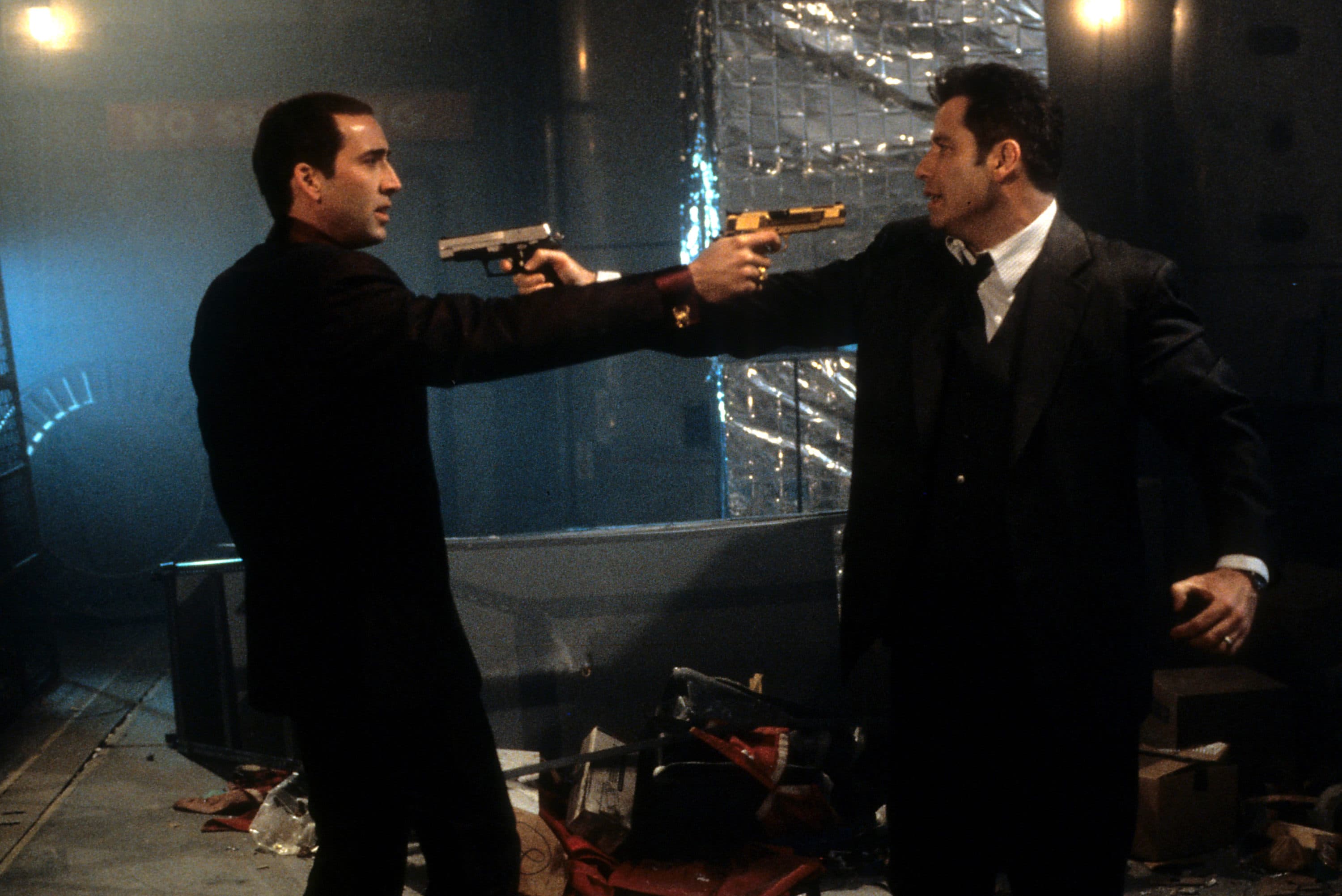
“They’re one-name movie stars,” explains the Somerville Theatre’s creative director Ian Judge. “Cage. Travolta. So many of their roles are iconic… so many career highs and lows.” But we’re sticking with the highs right now for “Face/Off: Travolta/Cage,” a 10-week, 19-film series of double features currently running at the recently refurbished, 108-year-old movie palace in Davis Square. Every Tuesday night during the months of March and April, a film starring John Travolta is followed by one starring Nicolas Cage, culminating on May 3 with “Face/Off,” director John Woo’s delirious 1997 action extravaganza in which the actors literally wear each other’s faces for most of the running time, doing spot-on impersonations of one another in a madcap, meta-movie hall of mirrors and balletic gunplay. Fun fact: “Face/Off” was the first time I ever went to see a movie and then went back to watch it again the very next day.
According to Judge, the mashup of these mercurial movie stars was a natural way to jumpstart the theater’s repertory film program after a long lockdown and our bleak omicron winter. He first told me of his idea last summer when the theater was shuttered for renovations, over a perhaps unnecessary number of beers across the street at The Burren. We discussed at length how Travolta and Cage have made more bad movies than most stars of their stature, and the stink of those bombs can sometimes cloud their indelible contributions to film history. Indeed, the lineup Judge has put together for this series contains one cultural phenomenon after another. Films like “Saturday Night Fever,” “Moonstruck,” “Grease,” “Valley Girl,” “Raising Arizona” and “Pulp Fiction” have become part of our shared pop consciousness — they’re movies you feel like you’ve seen even if you haven’t. It’s also impossible to imagine any other actors playing these roles.
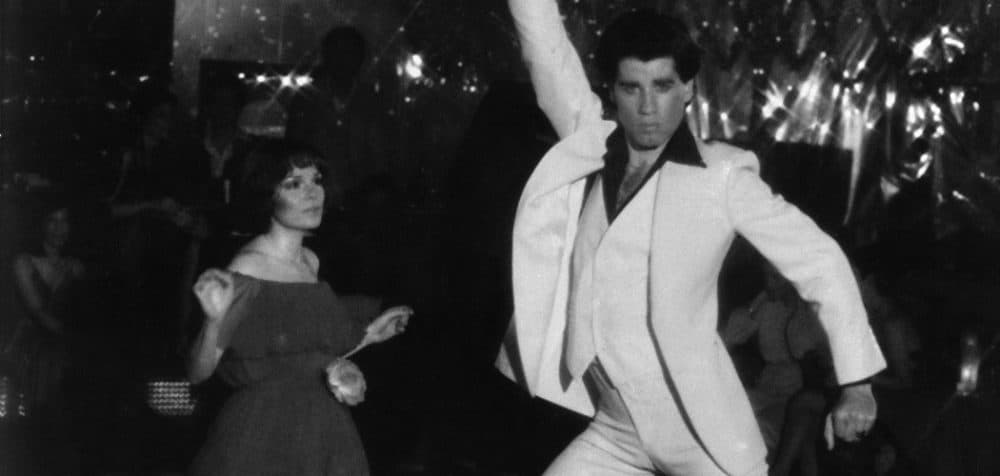
Early last year, I found myself talking to a director who was desperately trying to land Travolta for his next project, a risky drama about a drug dealer who does some very bad things. He told me “I want John because audiences will follow him anywhere. When he’s in the right role, he connects with you the way very few others can.” This struck me as understanding Travolta’s appeal in a way even the actor himself seems to have trouble with sometimes. Of course, John Travolta has always been cool — my generation grew up surrounded by posters and pinups of him in the white disco suit, the greaser getup or the cowboy shirt and Stetson — but he was also always accessible, vulnerable and even kind of a goofball.
Travolta was a sex symbol, but not in the aloof, standoffish manner of say, Richard Gere (who with "Days of Heaven," “American Gigolo,” “An Officer and a Gentleman” and “Pretty Woman” made an entire career out of movies Travolta turned down) but in a clumsier, more endearing fashion. The tension and excitement were in how his uncouth characters, so often lacking in basic table manners, could suddenly move with such exquisite grace, suggesting the possibility perhaps that he could be housebroken. We put up with the misogynist macho posturing of his Tony Manero in “Saturday Night Fever” or the redneck wifebeater in “Urban Cowboy” because Travolta lets us see the frightened little boy behind the masculine fragility. A PG-rated version of the same conflict plays out in “Grease,” with Danny Zuko learning how to not act like the dude all his dumb friends want him to be.
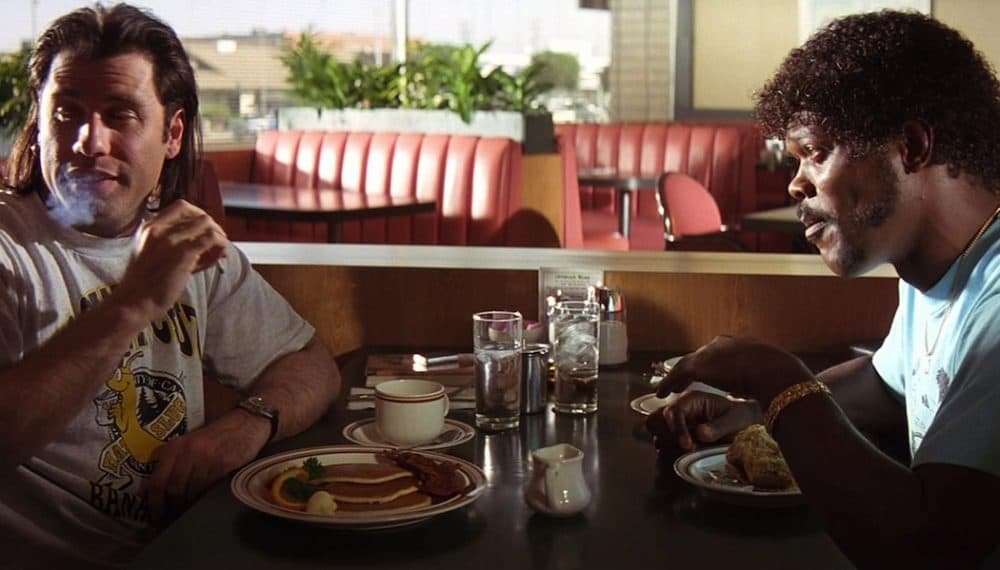
I don’t think many movie icons have failed onscreen so consistently or magnificently as Travolta, tragically so in Brian De Palma’s “Blow Out.” The actor’s first role as an actual adult with a job is a classic De Palma patsy, thinking he has everything figured out before face-planting in the heartbreaking finale. His blundering is played to much more amusing effects in “Pulp Fiction,” where Travolta’s big superstar comeback came playing an impossibly charming, drug addict hitman who does not do a single thing right for the entire movie. He accidentally almost kills the boss’ wife, mistakenly shoots someone in the face, then gets killed himself because he was reading on the toilet during a stakeout. But man, can he dance.
Does any actor fall in love as ardently as Nicolas Cage? His eyes seem to liquify when gazing upon his intended, his whole body swooning with rapturous abandon. He’s a performer who makes big choices, putting it politely. It’s this commitment, the sheer sincerity, that I’m afraid has made Cage a figure of mockery for a self-protecting, ironic era when everything is reduced to memes. Sometimes it seems like Nicolas Cage came here from outer space — having interviewed him, I’d say it’s a 50/50 possibility — and yet the massive chances he takes and wild, full-bore physicality are always thrilling to watch, even in movies unworthy of his gifts. Financial troubles and a rough stretch of paycheck roles did a number on his popular and critical standing, but Cage has been on a career upswing as of late, headlining cult hits like “Mandy” and receiving warmly deserved kudos for his heartfelt performance in last summer’s kidnapped-pet drama, “Pig.”
Advertisement
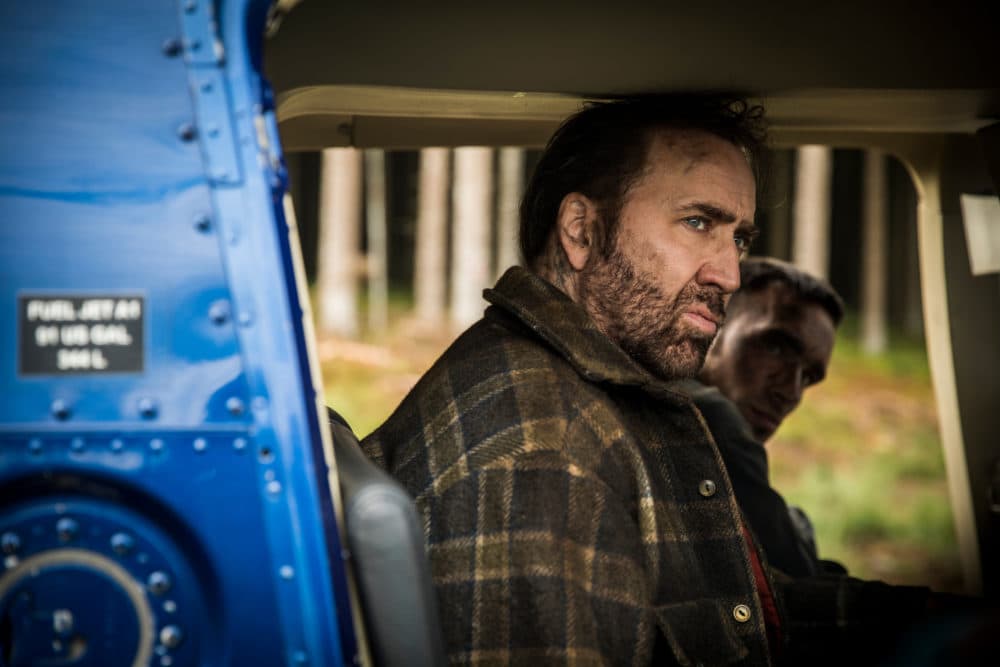
It was his fondness for the animal in that film that got me thinking about how affecting it is to watch Nic Cage in love. Whether as the rubber-limbed convict longing for mugshot photographer Holly Hunter in the Coen brothers’ “Raising Arizona,” or the adenoidal teen heartthrob wondering what’s up with his time-traveling prom date Kathleen Turner in Francis Ford Coppola’s “Peggy Sue Got Married.” (The nasally, braying voice Cage put on for the character famously inspired his co-star to ask if he was aware that film is a permanent medium, and purportedly also cost him a plum role in his uncle Francis’ “The Godfather Part III.”) His lovelorn mania for Cher’s skittish spinster is what sends “Moonstruck” soaring, Cage’s crazed performance embodying screenwriter John Patrick Shanley’s thesis of romance as a terrifyingly disruptive force: “Love don't make things nice,” the character passionately explains. “It ruins everything. It breaks your heart. It makes things a mess.”
My personal favorite Cage performance is in his most controversial love story, David Lynch’s “Wild at Heart.” The rockabilly road movie stars a snakeskin jacket-wearing Cage as Sailor Ripley, a rebel on the run with his jailbait gal, Lula (Laura Dern), in a frenzied, everything-including-the-kitchen-sink homage to 1950s juvenile delinquent flicks, Elvis movies and “The Wizard of Oz.” It’s a surreal, kitsch landscape of graphic violence, hot sex, sicko comedy and inexplicable, Lynchian interludes that had half the audience booing when it won the Palme d’Or at the 1990 Cannes Film Festival. The Somerville will be screening the original, X-rated, European edit of the film, which had to be trimmed for American audiences upon initial release. Hilariously, Judge has programmed it to follow Travolta’s adorable, surprise smash babysitting comedy from the previous year, “Look Who’s Talking,” in which the audience is privy to the inner monologue of a wiseacre infant voiced by Bruce Willis. (Judge jokes about how this might not be the best night “to take advantage of Somerville's lax psilocybin laws. Or maybe it’s ideal?”)
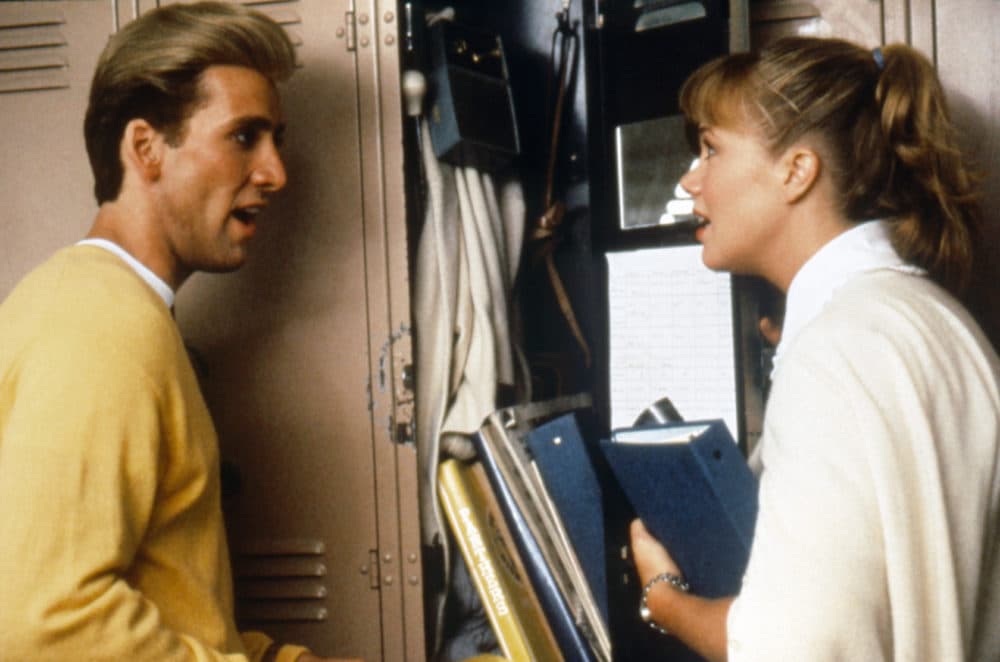
Other double features fit together more comfortably, whether we’re watching the hillbilly hijinks of “Raising Arizona” paired with “Urban Cowboy,” or “Grease” and “Peggy Sue Got Married,” both with their 35-year-old high school students. Some other less-heralded gems in the series include “Red Rock West,” John Dahl’s nifty, rarely-screened 1993 neo-noir in which Cage plays it straight against an unhinged Dennis Hopper, and “Get Shorty,” Barry Sonnenfeld’s breezy 1995 Elmore Leonard adaptation pits Travolta’s smooth-talking loan shark opposite prime supporting performances from Gene Hackman, Delroy Lindo, Dennis Farina and a pre-“Sopranos” James Gandolfini. The penultimate week programs “Broken Arrow” and “The Rock,” both actors’ first forays into the kind of blockbuster action movies that would eventually bog down their careers. Admittedly, were this chronological series to continue past the 1990s, such triumphs for these two stars would be a lot fewer and farther between. But hey, we’ll always have “Face/Off.”
"Face/Off: Travolta/Cage" runs at the Somerville Theatre through Tuesday, May 3.
